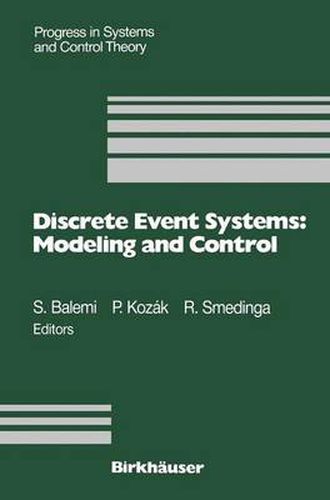Readings Newsletter
Become a Readings Member to make your shopping experience even easier.
Sign in or sign up for free!
You’re not far away from qualifying for FREE standard shipping within Australia
You’ve qualified for FREE standard shipping within Australia
The cart is loading…






This title is printed to order. This book may have been self-published. If so, we cannot guarantee the quality of the content. In the main most books will have gone through the editing process however some may not. We therefore suggest that you be aware of this before ordering this book. If in doubt check either the author or publisher’s details as we are unable to accept any returns unless they are faulty. Please contact us if you have any questions.
Research of discrete event systems is strongly motivated by applications in flex ible manufacturing, in traffic control and in concurrent and real-time software verification and design, just to mention a few important areas. Discrete event system theory is a promising and dynamically developing area of both control theory and computer science. Discrete event systems are systems with non-numerically-valued states, inputs, and outputs. The approaches to the modelling and control of these systems can be roughly divided into two groups. The first group is concerned with the automatic design of controllers from formal specifications of logical requirements. This re search owes much to the pioneering work of P.J. Ramadge and W.M. Wonham at the beginning of the eighties. The second group deals with the analysis and op timization of system throughput, waiting time, and other performance measures for discrete event systems. The present book contains selected papers presented at the Joint Workshop on Discrete Event Systems (WODES'92) held in Prague, Czechoslovakia, on Au gust 26-28, 1992 and organized by the Institute of Information Theory and Au tomation of the Czechoslovak Academy of Sciences, Prague, Czechoslovakia, by the Automatic Control Laboratory of the Swiss Federal Institute of Technology (ETH) , Zurich, Switzerland, and by the Department of Computing Science of the University of Groningen, Groningen, the Netherlands.
$9.00 standard shipping within Australia
FREE standard shipping within Australia for orders over $100.00
Express & International shipping calculated at checkout
This title is printed to order. This book may have been self-published. If so, we cannot guarantee the quality of the content. In the main most books will have gone through the editing process however some may not. We therefore suggest that you be aware of this before ordering this book. If in doubt check either the author or publisher’s details as we are unable to accept any returns unless they are faulty. Please contact us if you have any questions.
Research of discrete event systems is strongly motivated by applications in flex ible manufacturing, in traffic control and in concurrent and real-time software verification and design, just to mention a few important areas. Discrete event system theory is a promising and dynamically developing area of both control theory and computer science. Discrete event systems are systems with non-numerically-valued states, inputs, and outputs. The approaches to the modelling and control of these systems can be roughly divided into two groups. The first group is concerned with the automatic design of controllers from formal specifications of logical requirements. This re search owes much to the pioneering work of P.J. Ramadge and W.M. Wonham at the beginning of the eighties. The second group deals with the analysis and op timization of system throughput, waiting time, and other performance measures for discrete event systems. The present book contains selected papers presented at the Joint Workshop on Discrete Event Systems (WODES'92) held in Prague, Czechoslovakia, on Au gust 26-28, 1992 and organized by the Institute of Information Theory and Au tomation of the Czechoslovak Academy of Sciences, Prague, Czechoslovakia, by the Automatic Control Laboratory of the Swiss Federal Institute of Technology (ETH) , Zurich, Switzerland, and by the Department of Computing Science of the University of Groningen, Groningen, the Netherlands.